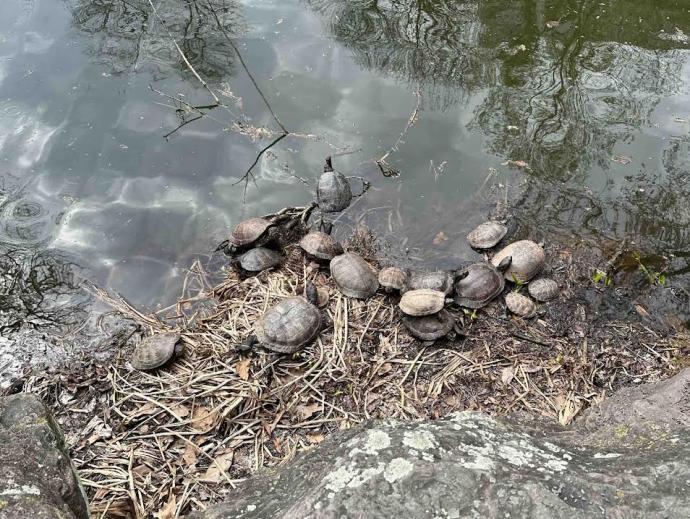Conserving Our Urban Wildlife Ecosystems - Tips from a Student Eco-Rep

Each year, a cohort of 10-20 Penn sophomores, juniors, and seniors are selected to participate in the Eco-Reps program. Students work in small teams throughout the year to develop in-depth projects aimed at solving environmental challenges on campus. This year, students of the program Alondra Betancourt, Daniel Boyko, and Paloma Gulick are working with Karen Verderame, Assistant Director of Outreach Education at Penn Vet to develop educational materials about conserving urban wildlife ecosystems and focusing on invasive turtle species in the BioPond.
Conserving Our Urban Wildlife Ecosystems - Tips from a Student Eco-Rep
Each year, a cohort of 10-20 Penn sophomores, juniors, and seniors are selected to participate in the Eco-Reps program. Students work in small teams throughout the year to develop in-depth projects aimed at solving environmental challenges on campus. This year, students of the program Alondra Betancourt, Daniel Boyko, and Paloma Gulick are working with Karen Verderame, Assistant Director of Outreach Education at Penn Vet to develop educational materials about conserving urban wildlife ecosystems and focusing on invasive turtle species in the BioPond.

A major problem conservationists of the BioPond are currently facing is the large population of invasive turtle species in the pond. Most turtles you see catching sun rays on the rocks of the BioPond are Red-Eared Sliders, which are native to the southern United States and northern Mexico, but they live rampant throughout the country due to turtle trafficking and the pet trade. Red-eared sliders are the most common turtle sold as pets, many of them sold illegally when they are babies, under 3 inches long. They grow to be a foot long and can live for over 30 years, owners do not always realize the care commitment and aquarium requirements when they acquire the turtle.
Sliders exclude native turtle species from basking, which is essential for the turtle's health by allowing it to dry out and warm up. They are active swimmers with excellent climbing skills, allowing them to outcompete native pond turtle species. Also, they may transmit diseases such as Salmonella, respiratory disease, or ranavirus to wild populations of turtles.
Many turtle owners who can no longer care for their red ear slider choose to “set them free” in a local body of water—problem solved, right? No. An abandoned turtle either dies quickly or reproduces, leading to their status as an invasive species that threatens native species in the ecosystem. Unfortunately, this is also how the BioPond became populated with these turtles, making it challenging to keep the BioPond stable.
To combat the issue of dumping pet turtles, the University of Pennsylvania School of Veterinary Medicine is urging the community to report sightings of the red ear sliders so they can map their evolving territory. Students of the Eco-Rep Program, specifically Alondra Betancourt, Daniel Boyko, and Paloma Gulick are working with Karen Verderame, Assistant Director of Outreach Education at Penn Vet to develop educational materials about conserving urban wildlife ecosystems. The Penn student body can improve the current situation by discouraging others from releasing any pet into the wildlife. What can be done instead? Think of a friend who could possibly love your pet the way you do or find a nearby pet adoption center that can help rehome the animal.
If you see a turtle around the BioPond, please upload a photo to the iNaturalist album linked here. If you see a turtle released, please report the incident to biopond@sas.upenn.edu with the date and time you saw the release occur.
Author: Alondra Betancourt (she/her)
School of Arts and Sciences | University of Pennsylvania
Class of 2026